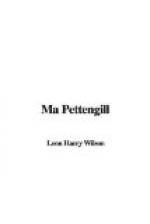“I didn’t either till I got down to Red Gap last winter and found out that was what we had been having. Here I been gritting along winter after winter, calling it work, and come to find out it’s what parties go a long distance to indulge in and have to wear careful clothes for it. Yes, sir; society is mad about it. Red Gap itself was mad about it last winter, when it got a taste of the big-league stuff. Next winter I’ll try to get the real sporting spirit into this gang of sedentaries up here; buy ’em uniforms and start a winter-sports club. Their ideal winter sport so far is to calk up every chink in the bunk house, fill the air-tight stove full of pitch pine and set down with a good book by Elinor Glyn. They never been at all mad about romping out in the keen frosty air that sets the blood tingling and brings back the roses to their wan cheeks.
“Take last winter. Not knowing it was sport it seemed at times like toil. First it snowed early and caught a lot of my cows and calves in the mountains. While we sported round with these, working ’em down into the valley, the weather changed. It snowed harder. Just oodles of the most perfectly darling snow. Then distemper broke out among the saddle horses. Then being already shorthanded, what does the fool vaquero boss do but pick a splinter out of his thumb with a pin and get blood poison enough to lay him off? Too much trouble for cussing. I tried that out scientifically. So I had to get out and make a hand. If I heard someone say I did as much as any three of these mollycoddles up here I’d just simper in silence and look down. Only I wish I’d known it was a fashionable winter sport. I’d of been more carefree.
“Then come the best of our winter sports—wood hauling through the drifts over a rocky road down the mountains. My lands, but it was jolly! On a quiet day there’d be only one runaway, one wagon fetched to the shop in sections, like a puzzle. Then another day all hands would seem to be quite mad about the sport, and nothing but the skinners and the mules would get back to camp that night—with the new outfit of harness and the hoodlum wagon going back next morning to see what could be salvaged.
“Finally we got the cows and calves home, got our wood in and started a general rodeo for the dry stock—Nature’s fleecy mantle getting thicker every minute. And none of us ever suspecting that it was a sport only the wealthy have a right to. If I’d suggested building an ice palace as a sporty wind-up I’ll bet the help wouldn’t of took it right. Anyway, I didn’t. With everything under shelter or fence at last I fled down to Red Gap, where I could lead a quiet life suitable to one of my years—where I thought I could.”
From the doorway Lew Wee softly called, “You come now!” We both heard him. Inside my hostess stealthily closed the door upon the gentle spring night; closed and locked it. Furtively she next drew curtains over the two windows. Then, candle in hand, she went lightly across the big living room to a stern and businesslike safe that stands against the farther wall. Kneeling before this she rapidly twirled the lock to a series of mystic numbers and opened the formidable doors.




